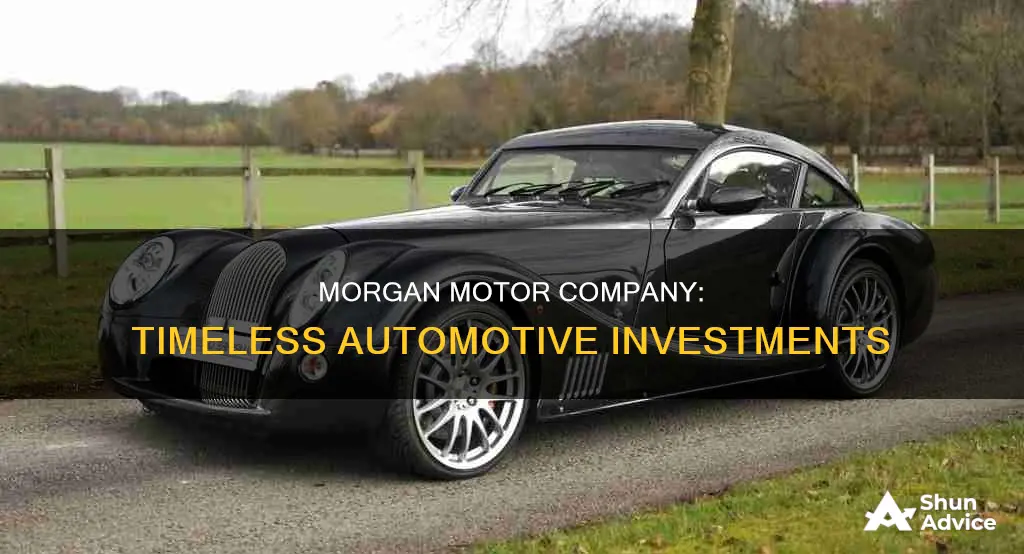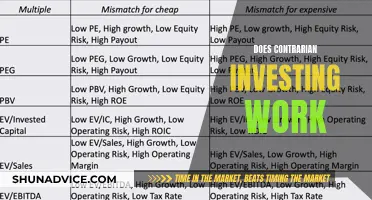
The Morgan Motor Company is a British manufacturer of hand-built premium sports cars with a classic design. Founded in 1909, Morgan has continued to hand-build premium sports cars, with wood used in their construction for over a century. The company was family-owned for most of its history until 2019, when an Italian investment firm, Investindustrial, acquired a majority stake.
With an annual production of about 700-850 cars, Morgan has a loyal customer base, and buyers are sometimes on a waiting list for up to six months or even ten years. The company's unique selling point is its adherence to traditional techniques, with each car handcrafted and assembled by hand.
The question of whether buying a Morgan car is a good investment depends on several factors. Firstly, Morgans are niche vehicles with a loyal following, and their traditional craftsmanship sets them apart from mass-produced cars. Secondly, Morgan has a long history and a reputation for sports car performance, which could make their vehicles desirable to collectors. However, it is essential to consider that the value of cars can fluctuate, and there may be running and maintenance costs associated with owning a classic car.
| Characteristics | Values |
|---|---|
| Company | Morgan Motor Company |
| Year Founded | 1909/1910 |
| Founder | Henry Frederick Stanley Morgan |
| Current Owner | Italian investment group Investindustrial |
| Previous Owner | Morgan family |
| Headquarters | Malvern, UK |
| No. of Employees | 220 |
| No. of Cars Produced Annually | 700-850 |
| Manufacturing Techniques | Traditional/historical |
| Waiting List | Six months to ten years |
| Revenue in 2018 | £33.8 million |
| Net Profit in 2018 | £3.2 million |
What You'll Learn

Morgan's history as a family-owned business
The Morgan Motor Company has a long history as a family-owned business. It was founded in 1910 by Henry Frederick Stanley Morgan, who quit his job at the Great Western Railway in 1904 to co-found a motor sales and servicing garage in Malvern Link. In 1909, he designed and built a car for his own use, and the following year, he began production. The Morgan Motor Company was registered as a private limited company in 1912, with H.F.S. Morgan as managing director and his father as its first chairman.
The company was then passed down through the generations, with Peter Morgan, son of H.F.S., taking over until a few years before his death in 2003. After Peter's death, a four-man management team was established, which included Charles Morgan, son of Peter. In 2010, Charles was named managing director, but in 2013, he was removed as managing director and replaced by Steve Morris. However, Charles continued as strategy director until October 2013, when he was removed as an employee and board member.
At the end of 2013, the shareholders appointed Andrew Duncan, a local solicitor and close friend of Peter Morgan, as chairman. In 2016, Duncan resigned and was replaced by a new director, Dominic Riley. In March 2019, a press release announced that the Italian investment group Investindustrial had acquired a majority stake in the company, ending over a century of family ownership. As part of the deal, the Morgan family retained a minority shareholding and continued to be involved in the company.
Ammeri Sports: Who Invests?
You may want to see also

The company's acquisition by Investindustrial
The Morgan Motor Company was acquired by Investindustrial, a European investment group, in 2019. The acquisition was announced on March 5, 2019, and the deal was expected to be completed in April. The deal was made public at the Geneva International Motor Show, where Morgan also announced a new model, the Plus Six.
The Morgan Motor Company had been family-owned for its entire existence, and the deal saw Investindustrial acquire a majority stake in the company. The Morgan management team and employees became shareholders, while the Morgan family retained a minority shareholding.
Investindustrial's chairman, Andrea Bonomi, praised Morgan's heritage and commitment to hand-building its cars. The CEO of Morgan, Steve Morris, said that the company was "coming off the back of two record years", and that Investindustrial was "the best possible owner and partner to take the business to the next level and develop Morgan's global potential".
The deal was valued at approximately the amount of a £6 million grant given to Morgan by the British government in 2016, which was used to purchase back the land and buildings on Pickersleigh Road, which had been sold in 2005/06 to fund the company.
The Long Game: Understanding Investment Time Horizons
You may want to see also

Morgan's unique manufacturing process
Morgan Motor Company is a British manufacturer of sports cars and was founded in 1910 by Henry Frederick Stanley Morgan. The company is based in Malvern, Worcestershire, and employs around 220 people.
Morgan cars are unique in their use of wood in their construction, a feature that has been maintained for over a century. The manufacturing process is highly labour-intensive, with each car being hand-assembled. This level of craftsmanship and attention to detail is a key part of the Morgan brand and contributes to the exclusivity of their vehicles.
The process begins with the creation of the body shell, which is framed using wood. This traditional technique is combined with modern materials, such as aluminium, to create a unique blend of old and new. The use of wood in the body shell is a signature feature of Morgan cars and sets them apart from other manufacturers.
The interior of a Morgan car showcases a range of natural materials, including ash wood, exquisite marquetry veneers, fine leather, and sustainable fabrics. The attention to detail extends to the rear-view and wing mirrors, which are machined from aluminium and finished to the highest standard.
Morgan's manufacturing process also incorporates modern technologies, such as the latest BMW engines and advanced sound systems. The combination of traditional craftsmanship and modern innovations ensures that Morgan cars offer a unique driving experience that blends the classic and the contemporary.
The waiting list for a Morgan car can be up to six months, and in some cases, it has been as long as ten years. This exclusivity is part of the brand's appeal, and the company has intentionally maintained traditional production techniques to preserve this exclusivity and differentiate themselves from mass-market car manufacturers.
Understanding Investment Characteristics: A Comprehensive Guide
You may want to see also

The brand's loyal customer base
The Morgan Motor Company has a loyal and active owners' community, affectionately known as "Moggies", with over 5,000 members and 50 clubs worldwide. The company's cars are sold in the UK, Europe, the USA, Japan, Australia, and the rest of the world. The company's headquarters in Malvern, UK, where cars continue to be manufactured using traditional techniques, attracts approximately 30,000 visitors annually.
The company's commitment to hand-building its cars and its use of wood in their construction for over a century have contributed to the brand's loyal customer base. The waiting list for a Morgan car can be as long as ten years, and the company has argued that this exclusivity helps them during recessions.
The brand's reputation for sports car performance, due to their extremely low weight, and their unique design have also contributed to their popularity. Morgan cars are known for their sliding pillar suspension system, which reduces unsprung weight, allowing the tyre and wheel to better respond to road surface irregularities.
Morgan's racing successes in the early 20th century, such as winning the 1913 Cyclecar Grand Prix at Amiens in France, also helped establish the brand's reputation and attract customers.
In recent years, the company has continued to innovate, introducing new models like the Plus Six, which was unveiled at the 2019 Geneva Motor Show and is based on the new CX generation platform. The company has also expanded its global reach, with international sales accounting for a significant portion of its revenue.
The loyalty of Morgan's customer base is further demonstrated by the fact that the company has been able to maintain its traditional manufacturing techniques and exclusive appeal despite increasing competition from modern car manufacturers. This loyalty, combined with the brand's reputation for quality and performance, has contributed to Morgan's success and longevity in the automotive industry.
Green Energy: Why the Hesitation?
You may want to see also

The company's financial performance
The Morgan Motor Company is a British manufacturer of hand-built premium sports cars with a classic design. The company was founded in 1909 and is currently headquartered in Malvern, UK, where it continues to manufacture cars according to traditional techniques. The company's facility, which opened in 1914, receives approximately 30,000 visitors each year.
In terms of financial performance, Morgan has reported steady revenue and profit figures over the years. In 2018, the company posted revenues of £33.8 million and a net profit of £3.2 million, selling approximately 700 cars. This represents a successful year for the company, with the chairman, Dominic Riley, stating that the previous two years had been the most successful in the company's 110-year history.
Additionally, Morgan has benefited from strategic partnerships and ownership changes. In 2019, the company was acquired by the Italian investment group Investindustrial, which also owns stakes in automotive brands such as Aston Martin and Ducati. This acquisition provided Morgan with the financial resources and expertise to further develop and expand internationally. The new ownership structure was carefully considered by the Morgan family, who retained a minority stake in the company, ensuring their continued involvement in the business.
In recent years, Morgan has also received government support. In 2016, the company was granted £6 million by the British Government, demonstrating the recognition of its contribution to the automotive industry.
Overall, Morgan's financial performance has been positive, with steady revenue growth, profit margins, and a dedicated customer base. The company's traditional craftsmanship, combined with strategic ownership changes and government support, has contributed to its financial success in the highly competitive automotive market.
Investing for Your Imminent Retirement: Strategies for the Final Stretch
You may want to see also







